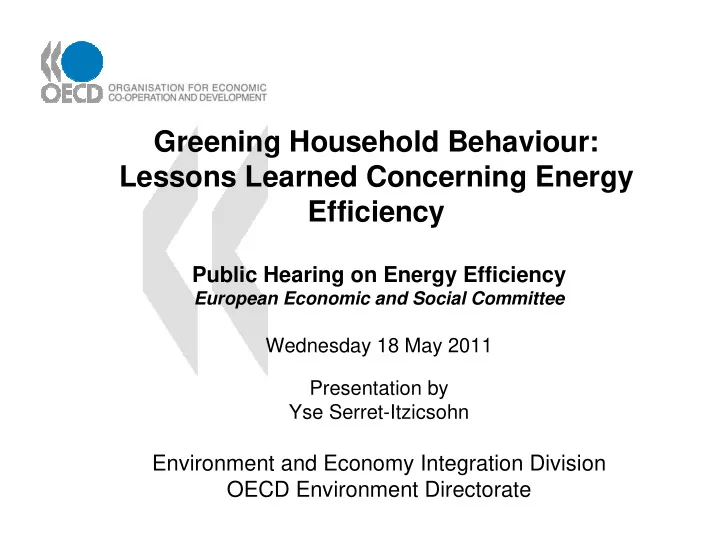

Greening Household Behaviour: Lessons Learned Concerning Energy Efficiency Public Hearing on Energy Efficiency European Economic and Social Committee Wednesday 18 May 2011 Presentation by Yse Serret-Itzicsohn Environment and Economy Integration Division OECD Environment Directorate
Objective • Demand side is receiving increasing attention from governments • This work provides new insights by covering a broad range of countries, sectors, impacts and environmental policies • Takes account of interactions between policy measures and households’ characteristics when assessing what affects behaviour • With the objective is to generate empirically-founded policy guidance on what really works
OECD Household Survey: First Round • Scope : Energy efficiency and renewable energy + 4 other thematic areas (transport, organic, waste, water) • Coverage : 10 countries (Australia, Canada, Czech Republic, France, Italy, Korea, Mexico, the Netherlands, Norway, Sweden) • Dependent variables : Environment-related purchases, behaviour, Willingness to Pay Method of data collection : Internet panel-based on-line • survey implemented in 2008 – stratified by age, gender, region and socio economic status for representativity • Total sample size : 10 000 respondents (approx. 1000 per country) Results recently published: Greening Household • Behaviour: The Role of Public Policy (OECD, 2011)
Examples of policy issues examined • What are the main factors influencing energy- saving behaviour at home? • What are the main factors influencing investments in energy-efficient equipments • How effective is energy efficiency labelling? • How do general attitudes towards the environment influence demand for energy efficiency? • Who invests in energy-saving equipment?
Motivation to reduce energy consumption at home
Proportion of households taking into account energy costs when purchasing/renting their current primary residence
Percentage of households who strongly agree with the statement that each individual/household can contribute to a better environment
Key Insights (1) • The importance of providing the right price incentive to spur behavioural change is confirmed - Energy metering is found to introduce more frequent energy saving activities such as turning off lights - Being metered also matters for investing in energy saving equipment (energy efficient appliances, thermal insulation)
Energy saving behaviour: influence of being metered
The Importance of Pricing: Investment in Energy Conservation (% ownership against unit pricing)
Key Insights (2) • The results indicate that economic incentives can be usefully complemented by providing information to consumers and education to induce changes on the demand side - Labels prove to be particularly effective if they relate to both the public and private benefits of the good or service (energy-efficiency labels) -Could exploit potential for private benefits to a larger extent (e.g. reduced bills due to energy-savings) - Need to ensure clarity in information market given to consumers and avoid competing and confusing labelling
The Role of Information: Recognition and Use of Energy-Efficiency Labels
Trust in Source of Information on Environmental Issues (Mean Rank: 1 = Most Trustworthy)
Key Insights (3) • Role of ‘norms’ not usually addressed in previous empirical studies • Results indicate that environmental (and social) ‘norms’ and ‘attitudes’ are important -Being concerned for the environment has a positive effect on energy saving behaviour and also increases the likelihood of investing in energy- efficient equipment (e.g. efficient hot water boiler) • Highlights the significant role information tools can play to change behaviour (e.g. public information campaigns)
Key Insights (4) • Need to combine supply-side and demand-side policies in order to maximise behavioural responses • This often involves combination of a price-based policy and supply of public services (e.g. smart metering, characteristics of electricity supply) • Weak demand for “green electricity” (few households WTP more than 5% above their bill) • However, need to take into account the costs associated with the introduction of supply-side (‘pull’) policies
Willingness-to-pay for renewable energy
Key Insights (5) • “Environmental” policy may not be sufficient if there are important non-environmental market barriers (information, split incentives) - For instance in the case of significant household- level investments (e.g. consumer durables) - Home owners are more likely to invest in thermal insulation, energy-efficient appliances and low- energy lighting • May need to introduce complementary policies to address the ‘other’ constraint on behavioural responses
Accounting for Market Conditions: Split Incentives in Energy Conservation (Home Ownership Status and Selected Investments)
Next Steps • New round of the OECD Survey implemented early 2011 to further analyse the drivers of environmental behaviour and household response to policies in the five areas: Energy, Transport, Organic, Waste, Water. • Eleven countries are taking part: Australia, Canada, Chile, France, Israel, Japan, Korea, the Netherlands, Spain, Sweden and Switzerland • Greater attention paid to demand-side barriers to policy implementation (i.e. policy ‘preferences’, norms) • Fuller incorporation of insights from behavioural economics • Examines ways to the development of a low-carbon economy and to promote green growth
Thank you Publication dedicated webpage ����������������������������������������������������� More information on OECD work available at: �����������������������������������
Recommend
More recommend